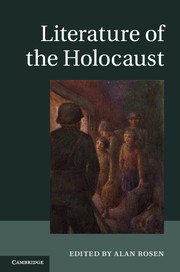Book contents
- Frontmatter
- Contents
- Notes on contributors
- Acknowledgments
- Introduction
- Part I Wartime victim writing
- Part II Postwar responses
- Chapter 3 The Holocaust and Italian literature
- Chapter 4 German literature and the Holocaust
- Chapter 5 Hebrew literature of the Holocaust
- Chapter 6 The Holocaust and postwar Yiddish literature
- Chapter 7 The Holocaust in Russian literature
- Chapter 8 The Holocaust in English-language literatures
- Chapter 9 Polish literature on the Holocaust
- Chapter 10 Hungarian Holocaust literature
- Chapter 11 French literature and the Holocaust
- Part III Other approaches
- Guide to further reading
- Index
- References
Chapter 8 - The Holocaust in English-language literatures
Published online by Cambridge University Press: 05 June 2014
- Frontmatter
- Contents
- Notes on contributors
- Acknowledgments
- Introduction
- Part I Wartime victim writing
- Part II Postwar responses
- Chapter 3 The Holocaust and Italian literature
- Chapter 4 German literature and the Holocaust
- Chapter 5 Hebrew literature of the Holocaust
- Chapter 6 The Holocaust and postwar Yiddish literature
- Chapter 7 The Holocaust in Russian literature
- Chapter 8 The Holocaust in English-language literatures
- Chapter 9 Polish literature on the Holocaust
- Chapter 10 Hungarian Holocaust literature
- Chapter 11 French literature and the Holocaust
- Part III Other approaches
- Guide to further reading
- Index
- References
Summary
English-language Holocaust literature is a tapestry of autobiographical writing by refugees and survivors who have abandoned their birth languages, by contemporaries based on research and imagination, and by post-Holocaust generations. American writing, the most prolific of the English-language contributions, accelerated when fueled by the 1961 Jerusalem trial of Adolf Eichmann, the intellectual debate aroused by Hannah Arendt’s analysis of the trial, and use of Nazi annihilation rhetoric by Arab nations during the 1967 Six Day War. While the Shoah was conspicuously absent from most Anglo-Jewish writing, those who found refuge in England as part of the Kindertransport and other émigré writers have incorporated Holocaust themes into British literature. Among the Commonwealth nations, Canadian Holocaust literature is most abundant, perhaps because of Canada’s own substantial immigrant Jewish population and its cultural links to the United States.
Kindertransport narratives
Decades after their childhood emigration to Britain, American Lore Segal and British writers Karen Gershon, Lotte Kramer, and Gerda Mayer created the Kindertransport genre, addressing the initial stress of separation from parents and the later pain of parental and extended families’ demise as well as the emotional stress of exile and assimilation to English society. Segal established the genre’s subject matter and tone in Other People’s Houses (1964). She conveys the loneliness of a child refugee, the discomforting adjustment to foreign culture, and the burden of presumed responsibility for her parents’ survival. Narrating from the child’s point of view, Segal relates the historic and personal: the annexation of Austria, the family home commandeered by the SS, parting with her distraught parents, initial feelings of alienation, and satiric accounts of English food and class prejudice. Holocaust witness, guilt for being absent when her parents perished, yearning for a lost home, and Zionist aspiration are recurrent themes in Gershon’s fiction and poetry. Her fictionalized autobiography, Bread of Exile (1985), maps the isolation engendered by feeling unwelcome when England interned German-Jewish refugees as possible enemy aliens. In A Lesser Child (1994) she chronicles the impact of the rise of Nazism on the private life of an assimilated German-Jewish child. Following decades of silence, Kramer re-engaged long-repressed memories in poems of childhood trauma in Nazi Germany, meditations on the lives lost in Europe, and English safety juxtaposed with European peril.
- Type
- Chapter
- Information
- Literature of the Holocaust , pp. 131 - 149Publisher: Cambridge University PressPrint publication year: 2013



